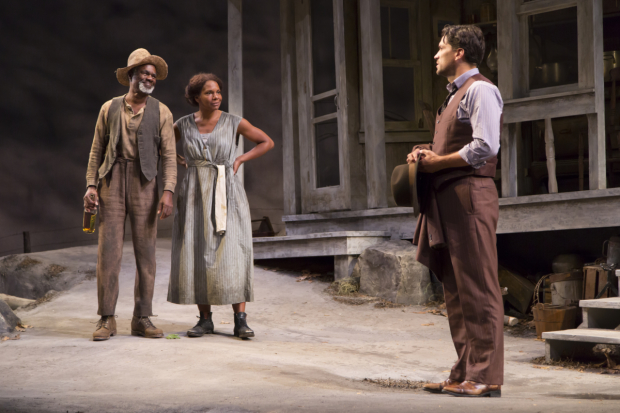A Moon for the Misbegotten

(© T. Charles Erickson)
One often approaches Eugene O'Neill's plays with a certain heaviness of heart: Weighty themes and tragically flawed characters seeking forgiveness are part and parcel of his works. That's certainly true of A Moon for the Misbegotten, now running at Williamstown Theatre Festival's Main Stage, but the two stars of this new revival, married couple Audra McDonald and Will Swenson, bring a bright energy and profound tenderness to a tragic story of ill-fated lovers that illuminates O'Neill's dark philosophy.
Moon is sometimes referred to as the sequel to Long Day's Journey Into Night, O'Neill's semiautobiographical play about the Tyrone family and its two brothers who struggle to deal with their mother's morphine addiction. One of those brothers, Jim Tyrone (Swenson), reappears in this play, 11 years after the action of Journey. It's now 1923, and he has inherited land in Connecticut left to him by his mother.
Tenant farmer Phil Hogan (Glynn Turman) lives on the estate with his powerfully built daughter, Josie (six-time Tony winner McDonald), and his adult son Mike (Howard W. Overshown), who leaves home at the outset of the play in search of a brighter future. Alcoholic brothel frequenter Jim has promised them that he will sell Hogan the land, but when it seems as though Jim might renege and sell instead to the Hogans' wealthy neighbor T. Stedman Harder (Aaron Costa Ganis), Josie and her father scheme to blackmail Jim by having Josie seduce him in order to create a scandal. While Josie and Jim have a boozy, moonlit date, their secrets and suppressed feelings for each other surface, and they wonder if a love between two such damaged souls has a chance to survive.
Gordon Edelstein's direction captures a whole wellspring of emotion in just under three hours. The play begins like a rural comedy of manners, with delightful banter between Josie and her father, followed by an uproarious scene with Harder. Not exactly the sort of thing one expects from O'Neill, but Edelstein and his actors (McDonald is wonderfully comical in these scenes) make the most of it until the skies darken with fearsome episodes of violence between Josie and Jim, followed by tender moments of affection. A particular highlight comes during Jim's confessional scene when Swenson delivers his speech with raw, drunken honesty as McDonald's Josie holds him maternally through their long night together on the house's steps. After the emotional tempests have subsided, the cathartic power of this scene is palpable.
Ming Cho Lee's detailed set — a small house on a barren, rocky hill backlit by a pensive, cloudy sky — makes for a particularly effective moment in the scene where Jim attempts to rape Josie. Partially obscured in the dim bedroom, Swenson and McDonald thrash at each other with terrifying ferocity. Jennifer Tipton's evocative lighting helps heighten that intensity and elevates the play into the realm of living portrait, particularly in the entr'actes. The gorgeous fading from day to night between Acts 1 and 2, for example, gives the silhouette of the house a magisterial, almost mythical presence. Rarely are such onstage transitions so breathtaking.
Though O'Neill wrote the play with a white Irish cast in mind (his notes describe Josie as having "the map of Ireland…stamped on her face," with "freckled, sunburned fair skin"), Edelstein, according to a program note, decided to cast the roles of Hogan, Josie, and Mike as African-American to depict the play's themes of class and power. But due to the strength of the play and its direction, together with exceptional performances from McDonald, Swenson, and Turman, by the end of the show all notions of race have evaporated, and we are left contemplating only the lives of two fragile humans fumbling awkwardly toward redemption under an indifferent moon.











